Carrying a brother with cerebral palsy across the Darién jungle in the hope of giving him a better life
The arrival of Venezuelans on the Honduran border has multiplied. So far this year, almost 500,000 people have crossed through the dense rainforest of the Colombia-Panama border, double the number from the previous number year
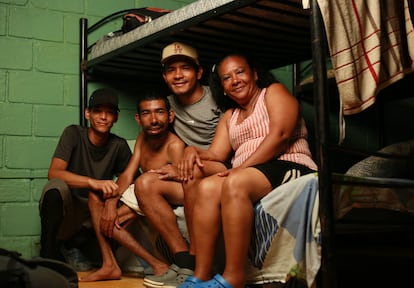

Dressed in red polo shirts and baseball caps, the girls from Claro, the cell phone service provider, are the first faces that newly arrived migrants in Honduras see. It’s five o’clock and dawn is breaking in Las Manos, one of this country’s border crossings with Nicaragua. It is the most direct route for those crossing Central America, and the busiest since the beginning of 2023. Hundreds of migrants get off the buses every morning and walk along a narrow dirt road that winds as it climbs into Honduras. The Nicaraguan border agents watch this parade of fatigue and hope from behind the fence. They do not intervene. One last hill, which is difficult for children, the elderly, and women carrying bulky luggage, and they will be in Honduras. Despite the adversities, the country will offer them relief and a place to a stop on the road to the United States.
When they set foot on Honduran soil, the Claro girls are waiting. They offer prepaid cell phones and internet cards for two dollars. Migrants need them to keep their families informed. Or to contact the coyote (a migrant smuggler) that makes a path for them in the distance. They buy them at the doors of the buses that for five dollars will take them along a road in the middle of nowhere to the migrant center between the towns of Danlí and El Paraíso. There they will receive a document of safe passage that allows them to transit through Honduras for five days to continue their journey north; they still have to cross Guatemala and Mexico before reaching their goal. The authorities do not object: no one wants to stay in a country that, due to safety concerns and lack of opportunities, sees many of its own citizens flee to the north. The travelers are pursuing the American dream, although for now they are in the grip of this nightmare of a trip. The journey is especially hard in areas like the Darién jungle, on the border between Colombia and Panama, where they are exposed to accidents, robberies, and sexual assault.
In the Darién Gap, the Valdayos — a Venezuelan family made up of a mother, Odalys, and her two children — were on the verge of succumbing to despair, fatigue, and pain: Alejandro, the eldest, suffers from cerebral palsy. His younger brother Jesús has literally carried his brother on his shoulders on a grueling journey through the rainforest. “The jungle was an odyssey. The mud exhausted Jesús, and he sank into it. We didn’t count on the rain, which wet the fabric and made it a lot heavier. He told me: ‘Mom, I can’t take it anymore. We had times of not knowing what to do. I asked God for forgiveness for having put my life and that of my children in danger. But we got through it. It was something extraordinary, the work of the Holy Spirit,” Odalys says.
In September, the International Organization for Migration (IOM) warned of an unprecedented wave of people transiting through this region. So far this year, almost 500,000 people have crossed the dense Darién rainforest, double the number the previous year. Like the Valdayos, the majority are Venezuelans, followed at a distance by Ecuadorians, Haitians, and a good number from the poorest corners of the planet. Cuban families who have left behind an island whose economy is in a coma and who make their way across the border with determination. Women with children and single men who have flown from countries in Africa and Asia to Brazil (sensitive to passports from the Global South), to explore Central America on foot and by road. They are the ones who are now at the Las Manos border crossing, the scene of a world in motion.
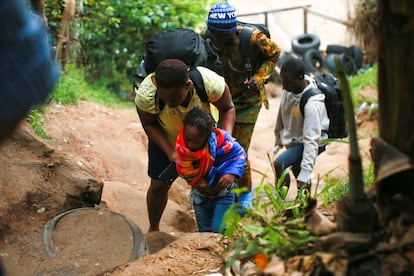
Jazmie Ouchi is a 38-year-old Angolan. She is carrying a heavy backpack on her back and is holding on to her five-year-old daughter. So far this year, the number of African migrants arriving at the southern border of Honduras has grown by 553%, according to IOM data. It took Jazmie less than a month to arrive in Honduras from Brazil. “In Angola the situation was very difficult, I think that in the United States we will have a chance,” she says hurriedly while waiting in line to board one of the yellow American school buses, converted into a regular bus here. The woman does not have the five dollars. She remains standing, hesitating, until a boy hanging around encourages her to get on anyway and points to the sky. She, the backpack and the daughter get on. There is no room for anyone else.
About 500 yards from the Las Manos pass, a Honduran police checkpoint stops the vehicle in which Jazmie has boarded. They force two people to get off: a Venezuelan boy and a Bangladeshi man who has traveled further than Ulysses after the Trojan War. They believe the boy is their coyote. He denies it: “I was only helping him because he doesn’t speak Spanish. Please, I want to keep going. I took risks, I crossed the jungle. Help me,” he begs. The police are not going to let him go, and they are absolutely not going to resolve the matter in front of witnesses. They confiscate his mobile phone and passport and take him to the posta (police station) in a private car. Sporting a luxury watch and an ostentatious gold signet ring, Agent Christian Ruiz says that the boy was traveling with foreign currency and that this is a sign of criminal activity. Humanitarian organizations report that abuses by the authorities are common at this and other borders along the route, especially among what they call “VIP migrants”: groups of Chinese or Kazakhs who travel with cash and who suffer systematic shakedowns by the border police.
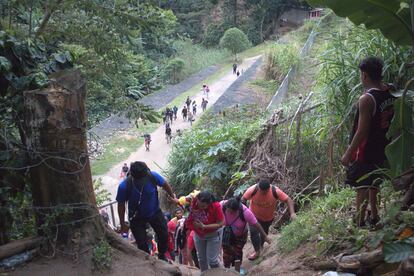
Venezuelans, who have nothing of value on them and live from hand to mouth, are allowed to move along with no problems. After obtaining their safe passage documentation, some migrants sleep in tents in squares and roundabouts, while others end up in a shelter in El Paraíso (on the Honduras’ eastern border) managed by the local charity Fundación Alivio del Sufrimiento (Relief from Suffering Foundation). It is one of the 30 projects that the Italian priest Ferdinando Castriotti has promoted in the country at the direct request of Pope Francis. The tall and talkative cleric has, among other things, converted the house seized from a local crime boss into a modest hotel with a restaurant called Piazza Italia. Castriotti hands out the dinner plates at the hostel, where activity is frenetic. “We can accommodate up to 300 people, and we are already full for tonight. Here the travelers have a somewhere to rest, get clean, and access the internet,” says the coordinator, Elida Vallecillo, as she walks down a hallway among children who are running around and playing. “They have crossed very difficult terrain, and there are more to come. It is the story of their life. Here they can have a rest,” she adds. The idea is that they spend one night before heading west, to the Aguascalientes post, on the border with Guatemala. It is an 18-hour trip that costs about $54 per passenger. But there are exceptions for special cases like the Valdayos’.
A year preparing the trip
The family is resting on two bunk beds in a large room with turquoise blue walls. Odalys, Alejandro, and Jesús are preparing to spend their third night at the shelter for weary travelers, and they do not want to continue until they get a wheelchair for Alejandro. They believe that they are over the worst (the Darién rainforest) but they know that other difficult stages await, like Mexico. In their hometown of Acarigua (250 miles west of Caracas) the situation had become unbearable. “We couldn’t afford food or medicine for the child,” says the mother of Alejandro, who also suffers frequent epileptic seizures. He is the reason for the journey; the family wants to improve his quality of life and, if possible, have him undergo spinal surgery because “he has a very strong curvature of the spine,” adds Odalys. She used to work in the Venezuelan Ministry of Education amid growing political pressures and with a dwindling salary. “They forced me to go to government rallies, they told me that if I didn’t cooperate in seeking votes they would exclude me from work...” Sitting next to her on the bed, Jesús, who hopes to work in as a graphic designer and programmer in the United States, remembers better times. “Going from living comfortably and with dignity to suddenly having nothing is very hard.”
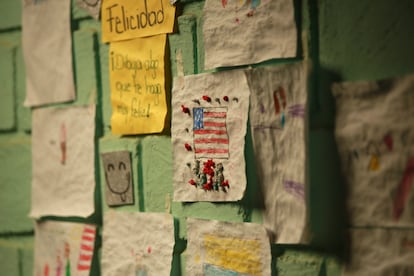
The family did not leave Venezuela in a hurry, but rather prepared thoroughly. For a year, Jesús exercised to gain muscle so he could carry his brother, who weighs 110 pounds. They tested ways to carry him with maximum comfort for both of them. They saw that the best way was to tie him with a cloth and carry him on their backs and shoulders, “like a child.” The Valdayos also watched documentaries on YouTube to find out what awaited them along the way. “We prepared ourselves physically and mentally.” Even so, there were times when it was not enough.
The electricity goes out and the commotion in the room subsides. The conversation continues by the light of a mobile phone flashlight. The Valdayos left Venezuela on October 4. They spare no details of the three-week trip that has brought them to this intermediate and relatively comfortable step that is Honduras. Jesús remembers every step the family took and what happened each day. In Colombia, the family took a boat to cross the river to Acandí, the gateway to Darién on the border of Panama. “At 5:40 a.m. a Christian service was organized. We prayed. And we started walking.” Jesús has a strong back, but the challenge is not only physical but also mental. “It is a very hard journey, especially in the Panamanian part, where there are only muddy roads. Everyone told us we wouldn’t make it.” “The water, the water!” says Alejandro, sitting in the other bunk, reminding Jesús to talk about the time when the river flooded.
On the Panamanian side, while fording rivers, the Valdayos had a stroke of luck: they found a large backpack with a metal structure, like the one used by parents who take their children trekking. Alejandro could now travel more comfortably. They were also safe from corrupt police forces and assaults from thieves; in part, they believe, because of Alejandro’s vulnerable condition. Others were not so lucky.
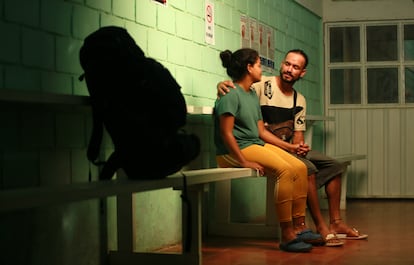
Assaults and abandonments
Eduardo Narváez and Génesis Durán are traveling with three teenage children. It is the first night in the shelter for this couple who left Venezuela to finance the medical treatment needed by their mothers, both of whom have heart problems. In Darién and on the border between Costa Rica and Nicaragua, some of their belongings were stolen. “And there is still Mexico, which scares me,” says Eduardo. The young man has not lost his sense of humor or, above all, his faith, which is omnipresent in El Paraíso. “We are the firstborn of our families. We will arrive in the name of God.” Génesis was in the military and hopes to work as a security guard. Eduardo can do everything (“I know how to weld, I’m a barber, a cook, a car mechanic, a bricklayer...”) and these days, in Honduras, he sells baby pacifiers to raise money to keep going. They have not forgotten the horror of the jungle, where they saw the best and worst of human nature: generosity when scarce food was shared, but also death, like that of an old woman who drowned. “We couldn’t help her, because the river rose so quickly.”
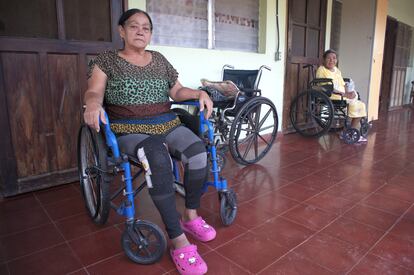
The face and the cross of humanity on a shared route. Yesmin Salcedo, another Venezuelan who left Maracaibo two months ago with a large group of neighbors, also knows something about this. Yesmin suffered a bad fall in the jungle. She didn’t break any bones, but as the days went by the pain became unbearable. She had to stop all the time. Her neighbors, who she thought were friends, got fed up with her. “They told me, ‘come on or stay here. We’re going to throw you out [of the group].’” Her willpower carried her, limping, to the border of Las Manos, where the group ignored her plight. “They left me alone and I haven’t heard from them again. If something like this happened to one of my people, I would stay with that person to fight until the end. I’m sad and disappointed,” she says from the columned patio of a nursing home in El Paraíso that looks like a kind of Roman domus also built by Castriotti. Yesmin is recovering slowly there. She does not know what to do. If she has to return to Venezuela, she hopes they will deport her (she does not see herself traveling back through Darién), but she no longer has anything because she sold her house “to get some money.” If she continues her journey, it is not clear to her that she will make it; at the moment, she is in a wheelchair.
Three weeks after the meeting at the shelter, Jesús sends an audio message through Whatsapp. The Valdayos have just arrived in Tecún Umán, on the southern border between Guatemala and Mexico. “We’re ok. We are seeing how the situation is to see if we can cross and reach Tapachula, where the shelter is.” There is a photo attached. It is Alejandro. He is making the victory sign with his fingers. He is sitting in a wheelchair.
This report has been prepared with the support of the United Nations Convention to Combat Desertification (UNCCD) and Aid in Action.
Sign up for our weekly newsletter to get more English-language news coverage from EL PAÍS USA Edition
Tu suscripción se está usando en otro dispositivo
¿Quieres añadir otro usuario a tu suscripción?
Si continúas leyendo en este dispositivo, no se podrá leer en el otro.
FlechaTu suscripción se está usando en otro dispositivo y solo puedes acceder a EL PAÍS desde un dispositivo a la vez.
Si quieres compartir tu cuenta, cambia tu suscripción a la modalidad Premium, así podrás añadir otro usuario. Cada uno accederá con su propia cuenta de email, lo que os permitirá personalizar vuestra experiencia en EL PAÍS.
¿Tienes una suscripción de empresa? Accede aquí para contratar más cuentas.
En el caso de no saber quién está usando tu cuenta, te recomendamos cambiar tu contraseña aquí.
Si decides continuar compartiendo tu cuenta, este mensaje se mostrará en tu dispositivo y en el de la otra persona que está usando tu cuenta de forma indefinida, afectando a tu experiencia de lectura. Puedes consultar aquí los términos y condiciones de la suscripción digital.








































